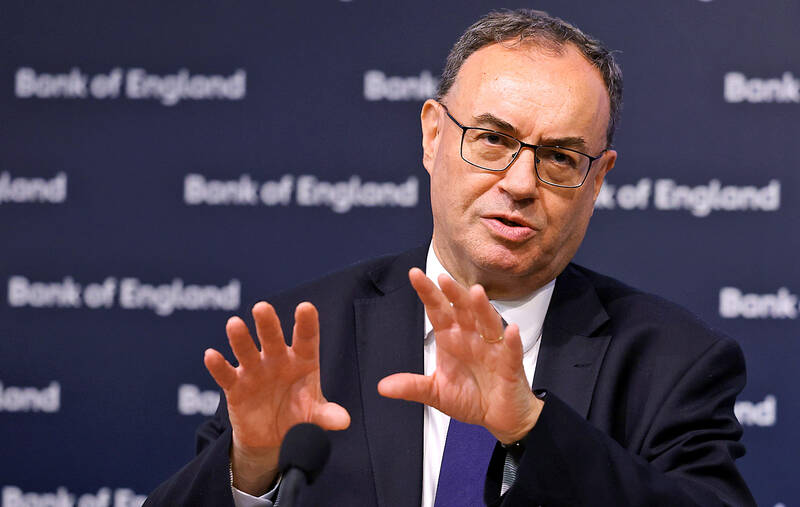The Bank of England (BoE) yesterday cut its main interest rate for the first time since the COVID-19 pandemic broke out in 2020, as British inflation has retreated in recent months.
In a tight 5-4 vote, BoE policymakers agreed to reduce borrowing costs by a quarter-point to 5.0 percent, the central bank announced following a regular meeting.
BoE Governor Andrew Bailey joined four other policymakers in bringing the rate down from a 16-year high, which will ease pressure on borrowers while denting interest earned by savers.

Photo: EPA-EFE
Retail banks tend to mirror the direction of BoE policy when setting their own interest rates.
"Inflationary pressures have eased enough that we’ve been able to cut interest rates," Bailey said in a short statement. "But we need to make sure inflation stays low, and be careful not to cut interest rates too quickly or by too much."
Britain’s annual inflation rate has returned to the BoE target of two percent, after soaring to a four-decade high above 11 percent in late 2022.
Following the BoE’s action yesterday, analysts said they expected the British central bank to cut again this year, but maybe not as early as next month. That helped the pound claw back earlier losses.
Britain’s rate cut comes less than one month after the country elected a new government.
The center-left Labour administration has vowed to grow the UK economy but has already warned that state spending will be hampered by tight finances.
New British Chancellor of the Exchequer Rachel Reeves on Monday said Britain’s state coffers faced an extra £22-billion (US$28-billion) hole inherited from the previous Conservative government.
Reeves said the scale of the overspend was "not sustainable", and that not acting was "simply not an option" for her newly-elected government headed by Prime Minister Keir Starmer.
The Conservatives said this indicated tax rises were on the way.
Bailey yesterday added that "ensuring low and stable inflation is the best thing we can do to support economic growth and the prosperity of the country."
Later addressing a press conference, he urged caution following a "finely-balanced" rate decision.
"The UK economy has been stronger in recent months and this is very welcome... but it does add to the risk that inflation could be higher" ahead.
"Despite easing, services price inflation and domestic inflationary pressures do remain elevated," he added.
The BoE hiked borrowing costs 14 times between late 2021 — when they stood at a record-low 0.1 percent — and the second half of last year.
The UK central bank last cut was in March 2020.

Semiconductor shares in China surged yesterday after Reuters reported the US had ordered chipmaking giant Taiwan Semiconductor Manufacturing Co (TSMC, 台積電) to halt shipments of advanced chips to Chinese customers, which investors believe could accelerate Beijing’s self-reliance efforts. TSMC yesterday started to suspend shipments of certain sophisticated chips to some Chinese clients after receiving a letter from the US Department of Commerce imposing export restrictions on those products, Reuters reported on Sunday, citing an unnamed source. The US imposed export restrictions on TSMC’s 7-nanometer or more advanced designs, Reuters reported. Investors figured that would encourage authorities to support China’s industry and bought shares

FLEXIBLE: Taiwan can develop its own ground station equipment, and has highly competitive manufacturers and suppliers with diversified production, the MOEA said The Ministry of Economic Affairs (MOEA) yesterday disputed reports that suppliers to US-based Space Exploration Technologies Corp (SpaceX) had been asked to move production out of Taiwan. Reuters had reported on Tuesday last week that Elon Musk-owned SpaceX had asked their manufacturers to produce outside of Taiwan given geopolitical risks and that at least one Taiwanese supplier had been pushed to relocate production to Vietnam. SpaceX’s requests place a renewed focus on the contentious relationship Musk has had with Taiwan, especially after he said last year that Taiwan is an “integral part” of China, sparking sharp criticism from Taiwanese authorities. The ministry said

US President Joe Biden’s administration is racing to complete CHIPS and Science Act agreements with companies such as Intel Corp and Samsung Electronics Co, aiming to shore up one of its signature initiatives before US president-elect Donald Trump enters the White House. The US Department of Commerce has allocated more than 90 percent of the US$39 billion in grants under the act, a landmark law enacted in 2022 designed to rebuild the domestic chip industry. However, the agency has only announced one binding agreement so far. The next two months would prove critical for more than 20 companies still in the process

CHANGING JAPAN: Nvidia-powered AI services over cellular networks ‘will result in an artificial intelligence grid that runs across Japan,’ Nvidia’s Jensen Huang said Softbank Group Corp would be the first to build a supercomputer with chips using Nvidia Corp’s new Blackwell design, a demonstration of the Japanese company’s ambitions to catch up on artificial intelligence (AI). The group’s telecom unit, Softbank Corp, plans to build Japan’s most powerful AI supercomputer to support local services, it said. That computer would be based on Nvidia’s DGX B200 product, which combines computer processors with so-called AI accelerator chips. A follow-up effort will feature Grace Blackwell, a more advanced version, the company said. The announcement indicates that Softbank Group, which until early 2019 owned 4.9 percent of Nvidia, has secured a